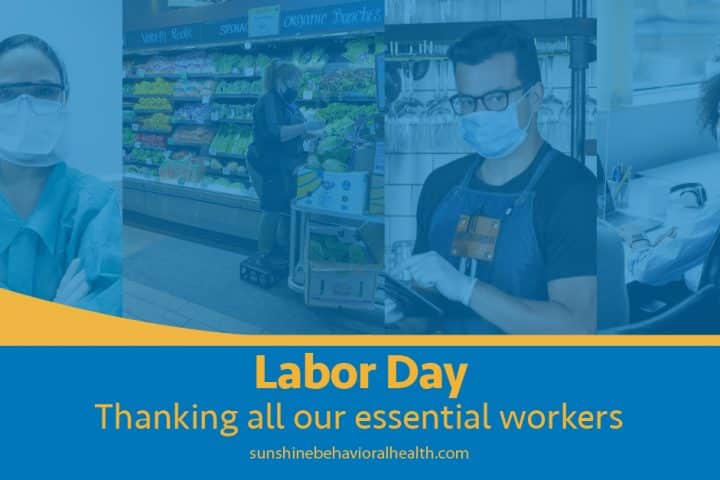
Essentially Overworked: Labor Day and the Mental Health Struggles of Essential Workers During the Pandemic
This Labor Day (September 6), we are reminded of all our workers across many occupations and their work and sacrifices. During the COVID-19 pandemic, essential workers have been in a league of their own. Hailed as heroes, what are some of their mental health struggles in the midst of uncertain times?
The pandemic shook the workforce in 2020. In the early stages of the pandemic, many businesses closed or moved online, with millions of workers ordered to stay at home. What has remained are industries that serve as pillars for essential needs, such as hospitals and other health care resources, grocery stores and markets, utility services, transportation providers, and others.
Workers in these essential fields continued doing their jobs, exerting tremendous effort as they faced amplified risks. Political leaders praised them for their sacrifice and heroic deeds during tumultuous times. People shared posts on social media and thanked essential workers for holding the line during times of distress.
People who work in these necessary fields are often known as essential workers or frontline workers.
After we’ve seen the tenacity and strength of our essential workers, Labor Day can remind us of their continued efforts and how the pandemic and other factors have affected them. Given the difficulties of their duties, they might be experiencing personal struggles such as mental health problems. It could be helpful to examine some common causes of mental health issues among essential workers and how we can help them.
Increased demand for services
Throughout the pandemic, there has been an increased demand for essential workers and their services. During the early stages of the spread of COVID-19, many people rushed to stores to fulfill their basic needs or purchase stockpiles of materials because they feared future shortages.
Increased demands for the services of essential workers meant that many of them worked long and difficult hours. But when people are forced to adjust to sudden, stressful changes, they might experience conditions such as anxiety and depression.
A 2020 survey found that 27.4% of essential workers experienced depression and anxiety. Other essential workers said that they could have benefitted from more mental health assistance than they received.
How we can help: If we have loved ones who are essential health workers, it could be useful to check with them periodically. We can ask how they are, listen if they need someone to talk with, or send messages of encouragement to help them get through their day. It’s also important to be gracious with the essential workers we meet, offering kind words and actions as well as patience and understanding.
Health uncertainties for themselves and loved ones
Essential workers may also face worries about their health. Since their jobs often require them to interact with many strangers, essential workers’ risk of contracting COVID-19 is higher than other workers who can opt to stay at home.
In addition to their concerns about themselves, they might also worry about their loved ones who may be at risk of contracting the virus from them. Essential workers might worry that they don’t have enough protection and might try to self-medicate by using alcohol or drugs to cope.
Thankfully, many people have received COVID-19 vaccinations and some health restrictions have eased. Still, we can be mindful of the needs of essential workers who still might be experiencing higher stress levels and other challenges.
How we can help: Donating supplies such as sanitizer or masks to essential workers may be helpful to provide physical protection and a little peace of mind. Not hoarding such supplies can also ensure that our essential workers have enough. Listening can also offer emotional support to people who have been experiencing anxiety and depression.
Financial struggles
Financial struggles have also been a cause of stress among essential workers during the pandemic. Even as they continue to work, their salaries may not be enough to cover the needs of their households. If an essential worker or a loved one catches COVID-19, they might not have enough money or adequate health insurance to cover their medical bills.
Combined with the health risks involved in working through the COVID-19 surge as well as job-related stress, this financial uncertainty can contribute to mental health problems that affect different areas of essential workers’ lives.
How we can help: We can provide financial help or basic goods for the essential workers we know and love. There are also ways to donate to frontline organizations. If you have a family member or friend who is experiencing substance abuse problems, you can support them by financially contributing to their treatment or assisting them with other needs.
Labor Day: celebrating workers
This Labor Day, we can celebrate our valued workers by providing community resources to help them stay mentally well and physically healthy. By contributing in different ways, we can acknowledge the Labor Day holiday and the essential workers who have sacrificed so much during the pandemic and beyond.
Sources
ncbi.nlm.nih.gov – Depression, Anxiety, and Lifestyle Among Essential Workers: A Web Survey From Brazil and Spain During the COVID-19 Pandemic
britannica.com – Labor Day
sunshinebehavioralhealth.com – Co-Occurring Disorders and Addiction: Examining the Not So Hidden Links
time.com – TIME for Giving: Support Frontline Organizations Helping in Fight Against Coronavirus
sunshinebehavioralhealth.com – 11 Family Roles in Addiction
A Message From Our CEO
Medical disclaimer:
Sunshine Behavioral Health strives to help people who are facing substance abuse, addiction, mental health disorders, or a combination of these conditions. It does this by providing compassionate care and evidence-based content that addresses health, treatment, and recovery.
Licensed medical professionals review material we publish on our site. The material is not a substitute for qualified medical diagnoses, treatment, or advice. It should not be used to replace the suggestions of your personal physician or other health care professionals.






